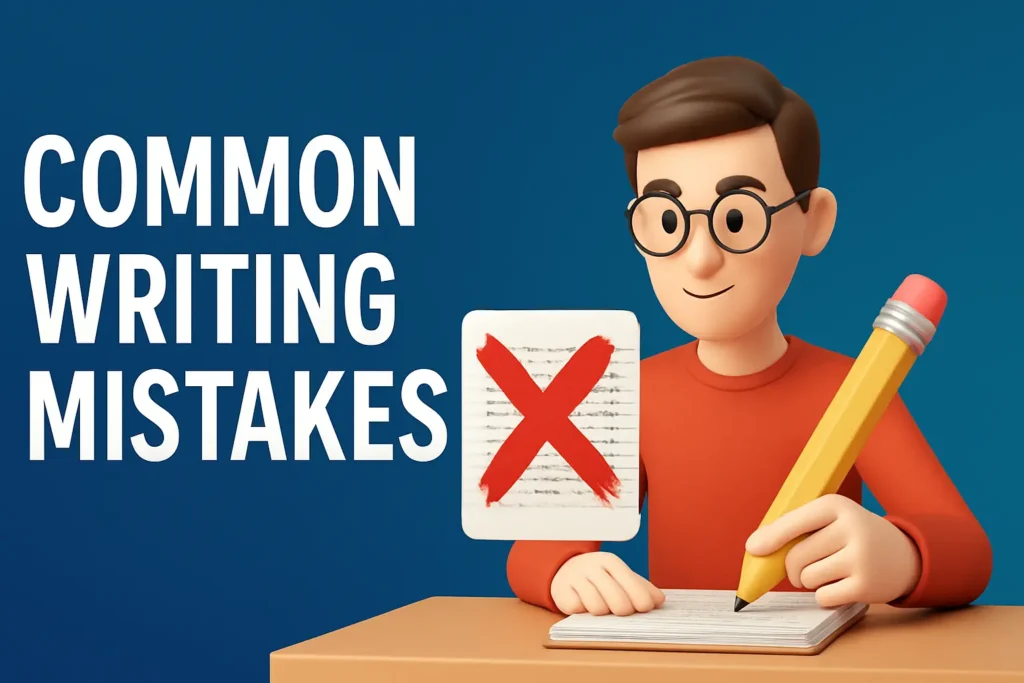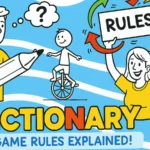Table of Contents
ToggleWe’re making mistakes in our writing, which makes our writing structure unclear and weakens our message. Even professional writers can fall victim to writing mistakes that quietly sneak into their work.
These are not grammatical or spelling mistakes that every writer notices. These hidden errors, like unclear sentences, misplaced words, or awkward phrasing, can make your writing look unprofessional and confuse readers.
The truth is, writing errors are easy to miss because your brain reads what you meant to write, not what’s actually on the page. Whether you’re working on an email, blog post, or report, these small mistakes can weaken your message and credibility.
In this guide, you’ll discover the most common writing mistakes that are hard to spot but simple to fix. You’ll also learn quick editing and proofreading tips to make your writing clearer, more engaging, and polished, so every sentence leaves the right impression.
Why Writing Mistakes Are Easy to Miss
Writing mistakes are easy to miss because your brain automatically corrects what you read. When you review your own work, your mind fills in missing words, fixes spelling in your head, and overlooks awkward phrasing.
Another reason writing errors go unnoticed is focus. When you’re concentrating on expressing ideas, you pay less attention to punctuation, grammar, and sentence flow. As a result, simple proofreading errors like extra words, wrong tenses, or misplaced commas can be missed even after multiple edits.
These small writing mistakes can quietly weaken your sentences, distract readers, and make your writing feel less polished even if your ideas are brilliant.
In short, writing mistakes are hard to spot because your brain prioritizes meaning over detail. The key to avoiding them is awareness, patience, and effective self-editing techniques that reveal what your eyes often skip.
Different Types of Writing Mistakes
Writing mistakes come in many forms, and each affects your writing differently. Some errors are easy to spot, like spelling mistakes, while others, such as unclear structure or tone, can quietly weaken your message.
Here are the main types of writing mistakes most writers overlook:
Spelling Errors: Misspelled words or typing errors may seem harmless, but they instantly reduce credibility. e.g., “Recieve” instead of “Receive”. So, check spelling mistakes before publishing.
Grammar Errors: The most common writing mistakes are grammatical mistakes, such as Misused commas, or incorrect verb tenses, which confuse the reader. e.g, “She go to school every day” should be “She goes to school every day.”
Punctuation Errors: Missing commas or misplaced apostrophes can completely change sentence meaning. Proper punctuation ensures clarity and professionalism. e.g, “Let’s eat Grandma” vs. “Let’s eat, Grandma.”
Structure Errors:Long, unbalanced, or confusing sentences make your writing hard to follow. These structural mistakes often occur when ideas aren’t clearly linked or when transitions are missing. For Example, A paragraph with multiple unrelated ideas instead of one clear focus.
Word Choice Errors: Choosing words that sound unnatural or using an inconsistent tone can make your writing feel forced. These writing mistakes affect engagement. Always match tone to your audience and message. e.g, “Utilize” instead of “Use” or “Commence” instead of “Start.”
Style Errors: Inconsistent tone, overly formal phrasing, or unnecessary repetition weaken readability. For Example, switching from a casual to a formal tone mid-article or repeating the same phrase.
Common Writing Mistakes That Are Hard to Spot
As an editor and writer, I notice some writing mistakes repeatedly. While everyone knows the difference between “it’s” and “its,” there are plenty of subtle errors that quietly creep into our work. These lesser-known mistakes may seem harmless, but they can drain your writing of clarity, flow, and impact.
Keep the following tips in mind before you publish; it’s worth slowing down and scanning for these sneaky errors. These are common writing mistakes that often go unnoticed but are simple to correct once you’re aware of them.
Improper Apostrophes:
Apostrophes may be small, but they’re responsible for some of the most common writing mistakes. This tiny punctuation mark carries big weight in making your writing clear and professional.
Used correctly, apostrophes show possession or form contractions. Using incorrectly can confuse readers and make your writing appear careless.
An apostrophe is mainly used in two situations:
- To show possession (the writer’s notebook)
- To form contractions (it’s = it is, don’t = do not)
Many writers misuse apostrophes simply because the rules seem minor, but even small grammar errors can change the entire meaning of a sentence.
For Example:
❌ Its raining outside.
✅ It’s raining outside.
Here, “it’s” means it is, while “its” shows possession (The dog wagged its tail). This small difference is one of the most common punctuation mistakes in writing.
Another common misuse happens with plural nouns:
❌ The teacher’s are in the staff room.
✅ The teachers are in the staff room.
Remember: apostrophes don’t make words plural; they make them possessive. So, the writer’s pen refers to one writer, while the writers’ pens refers to pens belonging to multiple writers.
Commonly Misused Words:
Among the most frequent writing mistakes that even skilled writers make are those involving commonly misused words (After all, we’re human!). These errors often sneak into your content unnoticed because the words look and sound right, but have entirely different meanings.
The problem isn’t poor spelling or bad grammar; it’s choosing the wrong word, which can completely change the meaning of your sentence.
For Example:
❌ She didn’t know the effect her words would have on others.
✅ She didn’t know the affect her words would have on others. (Incorrect – “affect” is a verb; “effect” is the noun.)❌ I’ll call you later than we eat dinner.
✅ I’ll call you later then we eat dinner. (Incorrect – “then” refers to time; “than” is used for comparison.)❌ Your going to love this book!
✅ You’re going to love this book! (“You’re” = you are; “your” shows possession.)
Such word confusion can make your writing appear careless, reducing its clarity and professionalism. These mistakes aren’t about poor spelling or bad grammar; they’re about word choice accuracy and understanding subtle differences in meaning.
Reading your work aloud or using a reliable grammar checker can also help spot vocabulary errors before publishing.
Misplaced & Dangling Modifiers:
One of the trickiest writing mistakes even experienced writers make is misplacing or dangling modifiers. These sneaky grammar errors happen when a descriptive phrase is too far from the word it’s meant to describe.
Here’s how this mistake looks in real writing:
❌ Running to the bus stop, the rain soaked my clothes.
✅ Running to the bus stop, I got my clothes soaked by the rain.
👉 The modifier “Running to the bus stop” should describe you, not the rain.❌ Covered in chocolate, the child ate the cupcake.
✅ The child ate the cupcake covered in chocolate.
👉 The misplaced phrase makes it seem like the child was covered in chocolate instead of the cupcake.
These kinds of sentence clarity errors can make your writing confusing, forcing readers to stop and reread. To fix them, keep your modifiers as close as possible to the word or phrase they describe.
Wordiness:
Wordiness is one of the easiest writing mistakes to overlook. It happens when a sentence uses more words than necessary to express an idea. This makes writing sound repetitive, cluttered, and harder to read.
Too many unnecessary words slow readers down and make your writing sound less confident. Instead of adding depth, wordy sentences dilute your message and reduce clarity.
Here’s how wordiness can look in your writing:
❌ Due to the fact that she was late, we had to start the meeting without her.
✅ Because she was late, we started the meeting without her.❌ In my personal opinion, I think this plan should be reconsidered again.
✅ I think this plan should be reconsidered.
Cut redundant phrases like “in order to,” “at this point in time,” “the reason why,” and “due to the fact that.” Replace them with precise, powerful words that make your writing concise and professional.
Eliminating wordiness makes your writing sound polished, confident, and reader-friendly. Whether you’re writing emails, essays, or blog posts.
Too Many Adverbs:
Using too many adverbs is one of the most overlooked writing mistakes that can make your sentences sound weak or repetitive. Adverbs are words that describe how something happens (like quickly, really, very, suddenly).
Good writing relies on strong verbs, not filler words that describe how something was done. Instead of writing “ran quickly,” choose “sprinted.” Instead of “spoke loudly,” use “shouted.” The right verb already carries the energy
Here’s a quick look at common examples:
❌ She really wanted to win the competition.
✅ She was determined to win the competition.❌ He quickly closed the door behind him.
✅ He slammed the door behind him.❌ The manager spoke loudly to get attention.
✅ The manager shouted to get attention.
When you use fewer adverbs and stronger verbs, your writing becomes more engaging, persuasive, and memorable.
Too Much Passive Voice:
Passive voice is a sentence structure where the subject receives the action instead of performing it. It’s one of the most common writing mistakes that makes your sentences sound distant or unclear.
For Example:
❌ The report was completed by the team.
✅ The team completed the report.
In this example, the focus is on the action rather than the doer, which makes the sentence less direct and harder to read.
Here’s how to identify this common grammar mistake and fix it easily:
- Look for “be” verbs — words like is, was, were, been, or being.
- Check for “by” phrases — they often signal passive construction.
- Rearrange the sentence so the subject acts.
Examples:
❌ Mistakes were made during the presentation.
✅ The speaker made mistakes during the presentation.❌ The cake was eaten by the children.
✅ The children ate the cake.
Comma Splices:
A comma splice is one of the most overlooked writing mistakes, where two complete sentences are joined only by a comma instead of proper punctuation.
It’s easy to overlook because the sentence sounds fine, but grammatically, it’s incorrect.
For Example:
❌ I love writing, it helps me express my thoughts.
✅ I love writing because it helps me express my thoughts.
✅ I love writing; it helps me express my thoughts.
✅ I love writing. It helps me express my thoughts.
Correcting comma splices makes your writing sound clear, professional, and polished. It improves readability and ensures your sentences flow naturally, which helps readers stay engaged.
Sentence Fragments:
A sentence fragment is an incomplete sentence that doesn’t express a full idea. It’s one of the most common writing mistakes where a sentence looks complete but actually lacks a key part, usually a subject, verb, or complete thought.
For Example:
❌ Because I was tired.
✅ I went to bed early because I was tired.
Eliminating sentence fragments instantly improves your clarity, readability, and professionalism.
💡 Tip: You can easily check your content’s readability and tone using our free Word Counter Tool. It helps you spot long sentences, unnecessary words, and areas that could be simplified for better clarity.
Incorrect Capitalization:
One of the writing mistakes that can instantly make your text look unprofessional or careless, especially in business, academic, or online writing, is using Incorrect capitalization.
Incorrect capitalization happens when writers use capital letters where they don’t belong or forget to capitalize where necessary.
For Example:
❌ my Favorite Book is “the Great Gatsby.”
✅ My favorite book is “The Great Gatsby.”
Even skilled writers fall into this trap because the rules of capitalization can seem small, but their misuse can distract readers and weaken credibility.
Proper capitalization shows attention to detail and helps maintain reader trust. For better results, use a text case converter that changes to capitalization
Final Thoughts
Writing mistakes are easy to make but surprisingly simple to fix. Writing mistakes happen when small grammar slips, unclear phrasing, or extra words reduce the clarity and impact of your message.
Google decides that these writing mistakes in your content are not optimized and may not fully meet quality standards. Clear, error-free writing helps improve readability scores, user engagement, and ultimately, search visibility.
Great writing ranks better. Search engines reward content that’s clear, concise, and easy to understand. By spotting and correcting subtle writing mistakes, you not only improve your professionalism but also strengthen your website’s SEO foundation.
Before publishing, read your work aloud or use a proofreading tool to identify awkward sentences or unnecessary words.
Frequently Asked Questions (FAQs)
What are the most common writing mistakes beginners make?
The most common writing mistakes beginners make include:
- Grammar and punctuation errors
- Long, unclear sentences
- Overusing adverbs
- Confusing similar words like affect and effect
Forgetting to proofread
These simple errors can make writing look less professional.
How can I spot grammar mistakes faster?
To spot grammar mistakes faster:
- Take a short break before proofreading.
- Read your content aloud to catch missing words.
- Use a Word Counter or grammar tool to detect hidden errors.
Why do small writing mistakes make content look unprofessional?
Even small writing mistakes like typos or missing punctuation can reduce trust and readability. Readers may think the writer lacks attention to detail. Keeping your writing clean helps improve both credibility and ranking visibility.
What’s the best way to improve writing consistency?
The best way to improve writing consistency is to:
- Follow a clear style guide.
- Keep tone and formatting uniform.
- Review for sentence flow and grammar.


